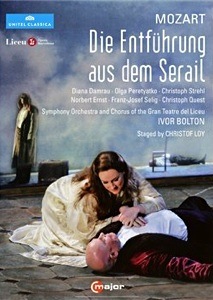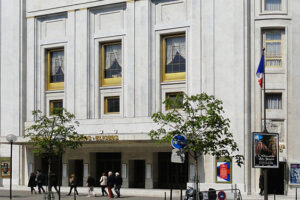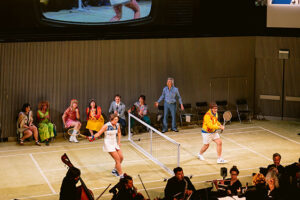
Die Entführung aus dem Serail has been a bit of an unruly child recently, with productions by Neuenfels and Bieito dividing audiences and inspiring critics like Heather MacDonald to lengthy manifestos. Christof’s Loy’s production for the Liceu (in co-production with La Monnaie and Oper Frankfurt, filmed
here in July of 2010) lies at the opposite end of the regie spectrum. His is a rather melancholy reflection on the nature of desire, focusing on Stockholm syndrome, with the women (perhaps) more suited to their captors than towards the men ostensibly coming to rescue them.
If the premise often ventures into ambiguous territory, the staging is modern, spare, and clean—so much so, that it often feels incongruous to the velvet interior of the Liceu, an interior that the Loy staging often places his characters directly into. Ideologically this makes quite a bit of sense: Belmonte enters from the audience, and our viewpoint is aligned with his as the Western invader. Instead of a sumptuous Topkapi palace, we see a dusty entrance room, swept with a light layer of sand, waiting out the last gasp of imperialism.
We never actually make it far into the Seraglio, although we are treated to a few brief glimpses on a second stage, set further upstage and removed from the main playing field by a dark abyss. The viewpoint is clear: we are viewing the East through Western eyes, music, and art form. Additionally, there is something refreshingly alienating about seeing the singers frequently in the audience in a filmed performance – it’s a constant reminder that this was designed as an intimate live experience, and not an HD broadcast.
Overall, the evening veers more towards succeeding as theatre than opera, mostly because of the retention of the endless dialogue. Ivor Bolton leads a firm performance from the pit. As usual he finds beautiful colors in the score, but his tempi, never known for being brisk, do little to pick up pace of the evening.
Christoph Strehl’s Belmonte is reminiscent of Hugh Laurie as Wooster, looking and sounding bleating and boorish. The voice is serviceable, but not particularly attractive. His Pedrillo, Norbert Ernst, has a more beautiful tone, but has some trouble negotiating the lower-lying notes of the role and tires as the evening continues.
Their Turkish counterparts are far more interesting. Franz-Josef Selig makes an ideal Osmin, at once appearing physically threatening and gruff, but singing with a surprising sweetness. Christoph Quest’s Selim is the centerpiece of the production, and he steals the show in this non-singing part. Neither loveable nor despicable, he negotiates a wide range of ambiguities that make his final act of forgiveness instinctive, rather than a librettist’s ex deus machina.
Diana Damrau certainly has the vocal chops for Konstanze, and has continually given feisty interpretations of a wide range of Mozart heroines throughout her career. She proves herself capable of the part, but seems contained by the staging, which boxes her into a perpetual state of indecision and restraint. Combined with some especially glacial tempi, she sounds less secure than usual, and is not at her best. Footage from an earlier outing of the production at Frankfurt finds her more dramatically engaged, and her 2008 CD “Mozart: Donna” features a searing studio recording of “Martern aller Arten” that sets a lofty benchmark.
Olga Peretyatko is fantastic as Blonde, feisty and sweet at the same time. Her light lyric rings with a clarity that suits Mozart perfectly.
If this is not a perfect evening at the Liceu, it is certainly a compelling one, and an intelligent reading of Die Entführung by cast and production team. Without ornate interiors or visceral explorations of sexual violence, we are left instead with an unusually intimate look into the characters. If this is not the most sumptuous or shocking production, it is perhaps the most human.

























Comments